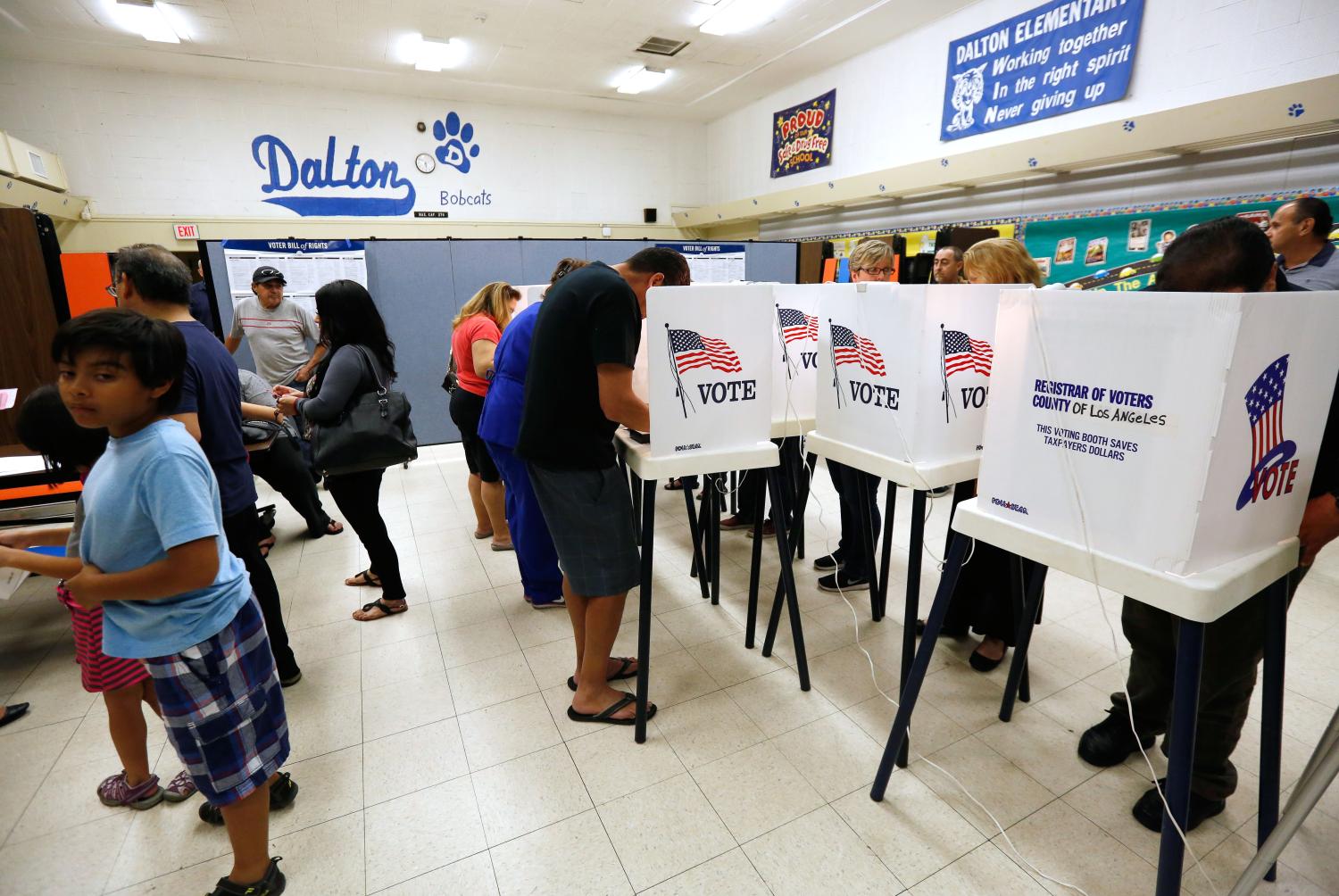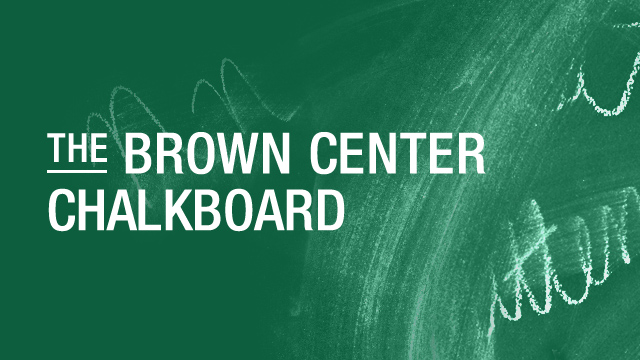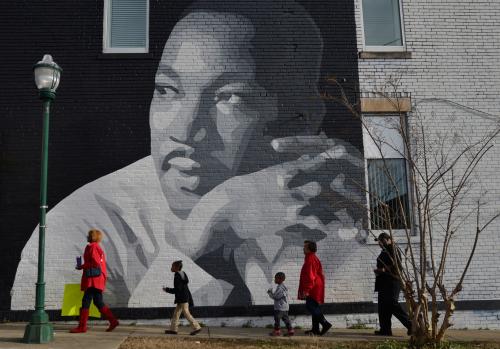Is there a viable political constituency for an equity agenda in education? More specifically, are the majority of voters concerned with holding elected officials accountable for closing the racial achievement gap in student learning?
This is more than an academic question.
In recent years, federal policymakers have put the racial achievement gap front and center on the national school reform agenda. Most notably, No Child Left Behind (NCLB) was premised on holding local governments accountable by making information on racial student subgroup performance available to parents and the public to, in the words of one scholar, “help advance the law’s equity objectives.” By making racial group test scores public, NCLB was intended to put direct external pressure—including electoral pressure—on local political authorities by arming citizens with key information about inequities in the performance of their local schools.
Yet, Washington’s approach to closing achievement gaps was largely based on a “Washington consensus.” Federal lawmakers mostly overlooked whether local electorates—voters and in turn school board members—prioritize or even pay attention to issues of education inequality.
Just this week, voters within the Los Angeles Unified School District went to the polls in a school board race that, while anomalous in many ways due to its huge size and significant campaign spending, is a reminder that education policy agendas are decided by a tiny fraction of voters who reside in the nation’s 14,000+ school districts. Moreover, as Chubb and Moe famously noted in “Politics, Markets, and America’s Schools”:
The proper constituency of even a single public school is a huge and heterogeneous one … [and] parents and students are but a small part of this constituency. [They] have a right to participate … but no right to win. In the end, they have to take what society gives them.
In places like Los Angeles and elsewhere, school reformers need to consider whether local electorates prioritize educational equity. If they don’t, the implications are quite extensive. Equity advocates would seemingly need to choose between changing public attitudes, reframing their vision of school reform to build a bigger tent of supporters, or overhauling current governance arrangements that rely heavily on local political institutions.
To gain better insight into whether most voters actually care about closing racial achievement gaps in learning—in other words, whether there is a viable and broad constituency for urban school reform—Patrick Flavin, of Baylor University, and I examined how well incumbent school board members fared in their re-election campaigns during a full decade of California elections.
Previous researchers have done important work investigating whether citizens vote retrospectively in school board elections—that is, whether board members are rewarded or punished based on improving aggregate student performance in their districts. Our study builds on this work by taking advantage of the recent proliferation of disaggregated student performance data to determine whether citizens are equally concerned about closing racial achievement gaps in learning.
Perhaps not surprisingly, we find that the answer is a pretty resounding “no.”
That is, the performance of racial minority students does not seem to influence the decision of most voters in their school board elections. Specifically, we analyzed over 1,500 California school board elections from 2004 to 2013 and found that voters rewarded or punished incumbent board members based on how well or poorly white students performed in their district. Racial minority student performance received comparatively little attention, irrespective of the numerical size of a district’s racial minority population.
For example, when we looked at English proficiency, an incumbent representing a school district with white student achievement at the 25th percentile (i.e., low performing) was 6.1 percentage points less likely to win re-election compared to an incumbent representing a district at the 75th percentile (i.e., high performing). For math proficiency, an incumbent in a poorly performing district, again based on white student achievement, is 7 percentage points less likely to win re-election. By contrast, our statistical analyses show that incumbent re-election fortunes are less predicted by Hispanic student achievement and not at all by African-American student achievement.
Why does racial minority student achievement not appear to factor into the evaluations voters make about school board incumbents at election time? Drawing on polling data from a 2001 Phi Delta Kappa and Gallup survey, we considered two possibilities. First, are most citizens aware that the racial education achievement gap exists? Second, if citizens are aware, do they believe elected officials are responsible and can do something to solve the disparities?
In short, we found that half of Americans are simply not aware of the lagging achievement of racial minority students, and among those who are aware of the achievement gap, the vast majority do not attribute the gap directly to the quality of education received. For example, when respondents to Phi Delta Kappa’s survey were asked, “Is the academic achievement of white students, nationally, higher, lower or about the same as that of black and other minority students?” fully 46 percent of respondents answered that average racial minority student achievement is the same or better than white students. In other words, nearly half of the population appears unaware of the well-documented disparities in academic achievement between white and racial minority students.
We also conducted a list experiment on a survey sample of California school board members (explained in more detail in the full paper), which revealed that approximately 40 percent of school board incumbents report that their constituents do not hold them accountable for addressing the racial achievement gap at election time. Also, when board members were asked to rank the importance of various issues facing their district, these local elected officials ranked “closing racial achievement gaps” among the least urgent items, regardless of how large or small the racial achievement gap was in their district.
When considered together, our findings suggest that the persistence of the racial education achievement gap in American education may, in part, be tied to the lack of electoral pressure exerted on public officials.
Others have noted this harsh reality in more strategic terms. As Rick Hess has written:
Achievement-gap mania has signaled to the vast majority of American parents that school reform isn’t about their kids … given that two-thirds of families with children do not live in underserved urban neighborhoods, or do not send their kids to public schools, or otherwise do not stand to benefit from the gap-closing agenda — the result is a tiny potential constituency for achievement-gap reform, made up of perhaps 6% or 7% of American households.
At a time when federal education policy is now devolving even greater authority to local decisionmakers under the Every Student Succeeds Act, it is important to pay vigilant attention to the impact of more decentralized governance on the future of the educational equity agenda. The evidence here seems to suggest that elites can’t go it alone when it comes to pursuing school reform – as Hess’ insight makes clear, reformers may need to focus on building a bigger tent.
The Brookings Institution is committed to quality, independence, and impact.
We are supported by a diverse array of funders. In line with our values and policies, each Brookings publication represents the sole views of its author(s).







